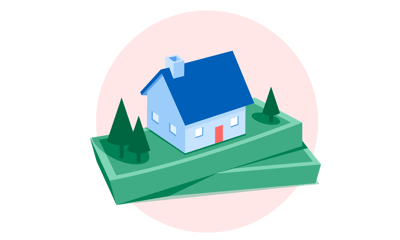Mortgage vs. Loan: Which Do You Need?




When you borrow money from a person or financial institution, it’s called a loan. Loans are often unsecured and used to finance many types of purchases.
A mortgage is a type of secured loan that’s used solely for the purposes of buying real estate.
Loans and mortgages: Key aspects
Loans
Loans can be used for numerous purposes, such as buying a car, opening a business, financing a vacation or paying for education expenses. Loans can be secured (by providing some form of collateral to guarantee payment) or unsecured (no collateral is provided).
Common types of loans include personal loans, student loans, car loans and even payday loans, each designed for specific needs and different qualification and repayment requirements.
Installment loans are repaid via set monthly payments that occur over a pre-arranged term. A line of credit, or revolving loan, allows you to withdraw and repay the money repeatedly over time.
Mortgages
Mortgages are only used for one purpose, and that’s to purchase or refinance real estate.
You can also use a mortgage to draw on the equity of a home you already own (sometimes called a second mortgage or home equity loan).
Mortgages come in many forms like open, closed and hybrid, or fixed-rate and variable-rate, and can have terms and amortization periods of various lengths.
Mortgage vs. loan comparison
Loans | Mortgages | |
|---|---|---|
Amounts | $100 up to tens of thousands of dollars. | Typically hundreds of thousands of dollars. |
Down payment | Not always required. | Always required. |
Terms | Several months up to five years. | Six months to 10 years. |
Interest rates | Fixed or variable; some types of unsecured loans can come with very high rates of interest of over 30%. | Fixed or variable; mortgages tend to have lower rates than personal loans and credit cards because they are secured. |
Repayment structures | Fixed payments on a set schedule. | Payment frequency may vary; amortization periods as long as 30 years. |
Mortgage vs. loan: Which one's right for you?
A loan may be a good option if you need to make a non-real estate purchase that you intend to pay off in five years or less.
A mortgage is ideal for those looking to buy a home, or for those who already have a home but want to refinance the mortgage or turn some of their property’s equity into cash.
To assess which product is better suited for your borrowing needs, carefully consider:
The amount you need to borrow.
What the funds will be used for.
How quickly you’ll be able to repay the funds.
What fees and interest rates may be involved.
What your prepayment options are, including any prepayment penalties.
What will happen if you can’t repay the loan according to the terms.
Best mortgage rates in Canada
Compare offers from Canada’s top mortgage lenders and brokers.
Tips for choosing the best loan or mortgage option
Here are some tips for choosing the best loan or mortgage option:
Consider whether it’s an unsecured or secured loan, and the risks involved with providing collateral, if necessary.
For a mortgage, think about how much of a down payment you can provide and whether or not you’ll pass the stress test.
With both loans and mortgages, there are a variety of ways to assess and compare interest rates, terms and fees. You can speak to a financial representative at your bank and then compare those rates with what you might get by using a mortgage broker. You can also start the rate shopping process online, by visiting the loan provider’s website or using an online rate comparison tool.
Reduce your debt load and strengthen your credit score before applying for a loan or mortgage, if possible, to help you get approved at better rates.
Frequently asked questions
Is a loan the same as a mortgage?
Is a loan the same as a mortgage?
Both involve borrowing money from a lender, but a mortgage is a type of loan that is specifically used to buy a property or borrow against your home’s equity.
Which is better, a loan or a mortgage?
Which is better, a loan or a mortgage?
Which type of loan is better for you will depend entirely on what you need the funds for and how much you want to borrow. Mortgages are typically used for purchasing real estate or leveraging home equity. Loans, on the other hand, are a more flexible and short-term option to get funds for a variety of purchases.
DIVE EVEN DEEPER

 Clay Jarvis
Clay Jarvis

 Clay Jarvis
Clay Jarvis